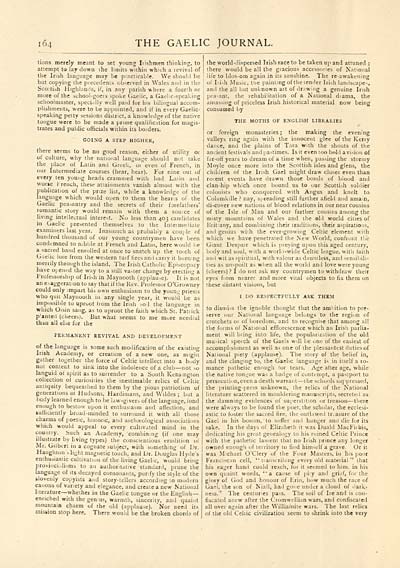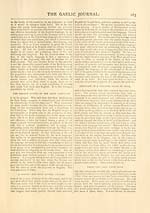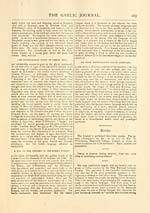Download files
Complete book:
Individual page:
Thumbnail gallery: Grid view | List view

104
THE GAELIC JOURNAL.
tions merely meant to set young Irishmen thinking, to
attempt to lay down ihe limits wilhin which a levival of
tlje Irish l.inLjiiage may be practicable. We shoüi.l be
but copying ihc piecedcnls observed in Wales ami in the
Scoitiah Higlil.in.ls, if, in any parish where a fourih or
mure of the school-goers spolie Gaelic, a Gaelic-speal.ing
schoolmaster, speci.dly well paid for his bilingual accom-
plishments, were to be appointed, and if in every Gaelic-
speaking petty sessions district, a knowledge of the native
tongue were to be made a prune qualific.ition for magis-
trates and puhlic officials within its boiders.
GOtNG A STEP HIGHER,
there seems to be no good reason, either of utility or
of culture, why the national language should nut take
the place of Latin and GreeU, or even of French, in
our Intermediate courses (hear, hear). For nine out of
every ten young heads crammed with bad Latin and
worse Ireiich, these attainments vanish almost with the
publication of the prize list, while a knowledge of llie
langu.ige which would open to them the hear;s of the
Gaelic peasantry and the secrets of their f.jrefathers'
romantic story would remain with them a souice of
living intellectual interest. No less than 403 candidates
in Gaelic presented themselves to the Inlei mediate
examiners last year. Inasmuch as probably a couple of
hundred thousand of our young countrymen have been
condemned to n,bble at French and Latin, here would be
a sacred band enrolled at once to snatch up the toich of
Gaelic lore from the western tuif fires and carrv it burning
merrily through the island. The Irish Catholic Episcop.icy
have opened the way to a still vaNler change by erecting a
Professorship of Irish in Maynooth (applause). It is not
anevaggeraiiontosaythatiflheRev. Professor O'Growney
could only impart his own enthusiasm to the young priests
who quit .Maynooth in any single year, it would be as
impussible to uproot liom the Irish .--o 1 the language in
which Oisin sang, as to uproot the faith which St. Patiick
p'anted (cheers). But what seems to me more neediul
than all el.se for the
PEK.MANENT REVIVAL AND DEVELOPME.NT
of the language is some such modification of the existing
Irish Academy, or creation of a new one, as might
gather to-ether the force of Celtic intellect into a budy
not content to sink into the indolence of a club — not so
languid ol spirit as to surrender to a South Kensington
collection ol curiosities the inestimable relics of Celtic
antiquity bequeathed to them by the pious patriotism of
generations 01 Hudsons, Hardimans, and Wildes; but a
body learned enough to be law-givers of the language, lond
enough to bestow upon il enthusiasm and affection, and
iufhcicntly broad-minded to surround it with all those
charms of poetic, historic, and archarological associations
which would appeal to every cultivated mind in the
couiuiy. .Such an Academy, combining (if one may
illustrate by living types) the conscientious erudition ol
Mr. Gilbert in a cognate subject, with something of l.)r.
Hauglnon slight magnetic touch, and Dr. Uouglas Hyde's
enthusiastic cultivation of the living Gaelic, would bring
proviiici..lisms to an authoritative standard, prune the
language of its decayed consonants, purify the style of the
slovenly coj.yists and story-tellers according to modern
canons of variety and elegance, and create a new National
literature—whether in the Gaelic tongue or the English-
enriched with the genius, warmth, sincerity, and quaint
mountain charm of the old (applause). Nor need its
misnon stop here. There would be the broken chords of
the world-dispersed Irish race to be taken up and attuned ;
there would be all the gracious accessories of National
life to blos-om again in its sunshine. The re-awakening
ol Iii^h Music, the painting of the tender Irish landscape-,
and the all but unknown art of dr.iwing a genuine Irish
pea-ant, the rehabilitation of a National diama, the
amassing of priceless Irish historical material now being
consumed by
THE MOTHS OF ENGLISH LIBRARIES
or foreign monasteries ; the making the evening
valleys ring again with the innocent glee of the Kerry
dance, and the plains of Tara with the shouts of the
ancient festivals and pastimes. Is it even too bold a vision of
far-off years to dreainof a time when, p.assing the stormy
Moyle once more into the .Scottish isles and glens, the
children of the Irish Gael might draw closer even than
recent events have drawn those bonds of blood and
clan-hip which once bound us to our Scottish soldier
colonists who conquered with Angus and knelt to
CoUimkiUe? nay, spreading still further afield and amain,
discover new nations ol blood relations in our near cousins
of the Isle of .Man and our farther cousins among the
misty mount.iins of Wales and the old world cities of
liritiany, and combining their traditions, their aspirations,
and genius with the ever-growing Celtic element with
which we have penetrated the New World, confront the
Giant Despair which is jneying upon this aged century,
body and soul, with a worli-wide Celtic league, with faith
and wit as spiritual, with valour as dauntless, and sensibili-
ties as unspoilt as when all the world and love were young
(cheers)? I do not ask my countrymen to withdraw their
eyes fiom nearer and more vital objects to (is. them on
these distant visions, but
I DO RESPECTFULLY ASK THEM
to dismiss the ignoble thought that the ambition to pre-
serve our National language belongs to the region of
crotchets 01 of boredom, and to recognise that among all
the foims of National efflorescence which an Irish parlia-
ment will biing into life, the popularization of the old
mu-ical speech of the Gaels will be one of the easiest of
accomplishment as well as one of the pleasantest duties of
National piety (applause). The story of the belief in,
and the clinging to, the Gaelic langu.ige is in itself a ro-
mance pathetic enough for tears. Age alter age, while
the native toni;ue was a badge of contempt, a pasrport to
persecution, even a death warrant — the schools suj-piesscd,
the printing-press unknown, the relics of the National
literature scattered in mouldering manuscripts, secreted as
the damning evidences of superstition or treason — there
were alw.iys to be found the poet, the scholar, the ecclesi-
astic to foster the sacied fire, the outl.iweil Ir^asure of the
Gael in his bosom, to suffer and hunger and die for its
sake. In the days of Elizabeth it was Duald MacFiibis,
dedicating his great genealogy to his mined Celtic Prince
with the pathetic lament that no Irish prince any longer
owneil enough of territory to find himself a grave. Or it
was Michael O'Clery of the F'uur Masters, in his poor
Francisc.Tii cell, " tianscribing every old material " that
his eager hand could reach, for it seemed to him. in his
own quaint words, "a cause of piiy and grief, for the
glory of God and honour of Erin, how much the race of
Gael, the son of Niall, had gone under a cloud of dark-
ness." The centuries pass. The soil of Ire and is con-
fiscated anew after the Cromwellian wars, and confiscated
all over again after the Williamite wars. The last relics
of the old Celtic civilization seem to shrink into the very
THE GAELIC JOURNAL.
tions merely meant to set young Irishmen thinking, to
attempt to lay down ihe limits wilhin which a levival of
tlje Irish l.inLjiiage may be practicable. We shoüi.l be
but copying ihc piecedcnls observed in Wales ami in the
Scoitiah Higlil.in.ls, if, in any parish where a fourih or
mure of the school-goers spolie Gaelic, a Gaelic-speal.ing
schoolmaster, speci.dly well paid for his bilingual accom-
plishments, were to be appointed, and if in every Gaelic-
speaking petty sessions district, a knowledge of the native
tongue were to be made a prune qualific.ition for magis-
trates and puhlic officials within its boiders.
GOtNG A STEP HIGHER,
there seems to be no good reason, either of utility or
of culture, why the national language should nut take
the place of Latin and GreeU, or even of French, in
our Intermediate courses (hear, hear). For nine out of
every ten young heads crammed with bad Latin and
worse Ireiich, these attainments vanish almost with the
publication of the prize list, while a knowledge of llie
langu.ige which would open to them the hear;s of the
Gaelic peasantry and the secrets of their f.jrefathers'
romantic story would remain with them a souice of
living intellectual interest. No less than 403 candidates
in Gaelic presented themselves to the Inlei mediate
examiners last year. Inasmuch as probably a couple of
hundred thousand of our young countrymen have been
condemned to n,bble at French and Latin, here would be
a sacred band enrolled at once to snatch up the toich of
Gaelic lore from the western tuif fires and carrv it burning
merrily through the island. The Irish Catholic Episcop.icy
have opened the way to a still vaNler change by erecting a
Professorship of Irish in Maynooth (applause). It is not
anevaggeraiiontosaythatiflheRev. Professor O'Growney
could only impart his own enthusiasm to the young priests
who quit .Maynooth in any single year, it would be as
impussible to uproot liom the Irish .--o 1 the language in
which Oisin sang, as to uproot the faith which St. Patiick
p'anted (cheers). But what seems to me more neediul
than all el.se for the
PEK.MANENT REVIVAL AND DEVELOPME.NT
of the language is some such modification of the existing
Irish Academy, or creation of a new one, as might
gather to-ether the force of Celtic intellect into a budy
not content to sink into the indolence of a club — not so
languid ol spirit as to surrender to a South Kensington
collection ol curiosities the inestimable relics of Celtic
antiquity bequeathed to them by the pious patriotism of
generations 01 Hudsons, Hardimans, and Wildes; but a
body learned enough to be law-givers of the language, lond
enough to bestow upon il enthusiasm and affection, and
iufhcicntly broad-minded to surround it with all those
charms of poetic, historic, and archarological associations
which would appeal to every cultivated mind in the
couiuiy. .Such an Academy, combining (if one may
illustrate by living types) the conscientious erudition ol
Mr. Gilbert in a cognate subject, with something of l.)r.
Hauglnon slight magnetic touch, and Dr. Uouglas Hyde's
enthusiastic cultivation of the living Gaelic, would bring
proviiici..lisms to an authoritative standard, prune the
language of its decayed consonants, purify the style of the
slovenly coj.yists and story-tellers according to modern
canons of variety and elegance, and create a new National
literature—whether in the Gaelic tongue or the English-
enriched with the genius, warmth, sincerity, and quaint
mountain charm of the old (applause). Nor need its
misnon stop here. There would be the broken chords of
the world-dispersed Irish race to be taken up and attuned ;
there would be all the gracious accessories of National
life to blos-om again in its sunshine. The re-awakening
ol Iii^h Music, the painting of the tender Irish landscape-,
and the all but unknown art of dr.iwing a genuine Irish
pea-ant, the rehabilitation of a National diama, the
amassing of priceless Irish historical material now being
consumed by
THE MOTHS OF ENGLISH LIBRARIES
or foreign monasteries ; the making the evening
valleys ring again with the innocent glee of the Kerry
dance, and the plains of Tara with the shouts of the
ancient festivals and pastimes. Is it even too bold a vision of
far-off years to dreainof a time when, p.assing the stormy
Moyle once more into the .Scottish isles and glens, the
children of the Irish Gael might draw closer even than
recent events have drawn those bonds of blood and
clan-hip which once bound us to our Scottish soldier
colonists who conquered with Angus and knelt to
CoUimkiUe? nay, spreading still further afield and amain,
discover new nations ol blood relations in our near cousins
of the Isle of .Man and our farther cousins among the
misty mount.iins of Wales and the old world cities of
liritiany, and combining their traditions, their aspirations,
and genius with the ever-growing Celtic element with
which we have penetrated the New World, confront the
Giant Despair which is jneying upon this aged century,
body and soul, with a worli-wide Celtic league, with faith
and wit as spiritual, with valour as dauntless, and sensibili-
ties as unspoilt as when all the world and love were young
(cheers)? I do not ask my countrymen to withdraw their
eyes fiom nearer and more vital objects to (is. them on
these distant visions, but
I DO RESPECTFULLY ASK THEM
to dismiss the ignoble thought that the ambition to pre-
serve our National language belongs to the region of
crotchets 01 of boredom, and to recognise that among all
the foims of National efflorescence which an Irish parlia-
ment will biing into life, the popularization of the old
mu-ical speech of the Gaels will be one of the easiest of
accomplishment as well as one of the pleasantest duties of
National piety (applause). The story of the belief in,
and the clinging to, the Gaelic langu.ige is in itself a ro-
mance pathetic enough for tears. Age alter age, while
the native toni;ue was a badge of contempt, a pasrport to
persecution, even a death warrant — the schools suj-piesscd,
the printing-press unknown, the relics of the National
literature scattered in mouldering manuscripts, secreted as
the damning evidences of superstition or treason — there
were alw.iys to be found the poet, the scholar, the ecclesi-
astic to foster the sacied fire, the outl.iweil Ir^asure of the
Gael in his bosom, to suffer and hunger and die for its
sake. In the days of Elizabeth it was Duald MacFiibis,
dedicating his great genealogy to his mined Celtic Prince
with the pathetic lament that no Irish prince any longer
owneil enough of territory to find himself a grave. Or it
was Michael O'Clery of the F'uur Masters, in his poor
Francisc.Tii cell, " tianscribing every old material " that
his eager hand could reach, for it seemed to him. in his
own quaint words, "a cause of piiy and grief, for the
glory of God and honour of Erin, how much the race of
Gael, the son of Niall, had gone under a cloud of dark-
ness." The centuries pass. The soil of Ire and is con-
fiscated anew after the Cromwellian wars, and confiscated
all over again after the Williamite wars. The last relics
of the old Celtic civilization seem to shrink into the very
Set display mode to: Large image | Transcription
Images and transcriptions on this page, including medium image downloads, may be used under the Creative Commons Attribution 4.0 International Licence unless otherwise stated. ![]()
| Early Gaelic Book Collections > Blair Collection > Gaelic journal > Volume 4, number 33 > (164) |
|---|
| Permanent URL | https://digital.nls.uk/79326467 |
|---|
| Description | No. 33, Vol. IV. 1889. |
|---|---|
| Shelfmark | Blair.217 |
| Attribution and copyright: |
|
| Description | A selection of books from a collection of more than 500 titles, mostly on religious and literary topics. Also includes some material dealing with other Celtic languages and societies. Collection created towards the end of the 19th century by Lady Evelyn Stewart Murray. |
|---|
| Description | Selected items from five 'Special and Named Printed Collections'. Includes books in Gaelic and other Celtic languages, works about the Gaels, their languages, literature, culture and history. |
|---|

